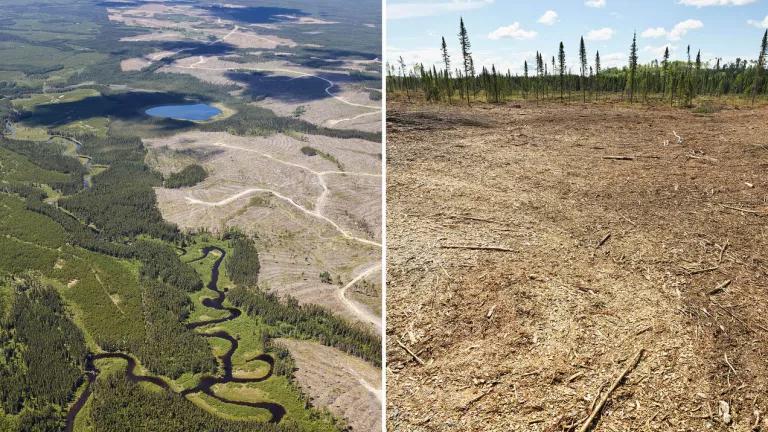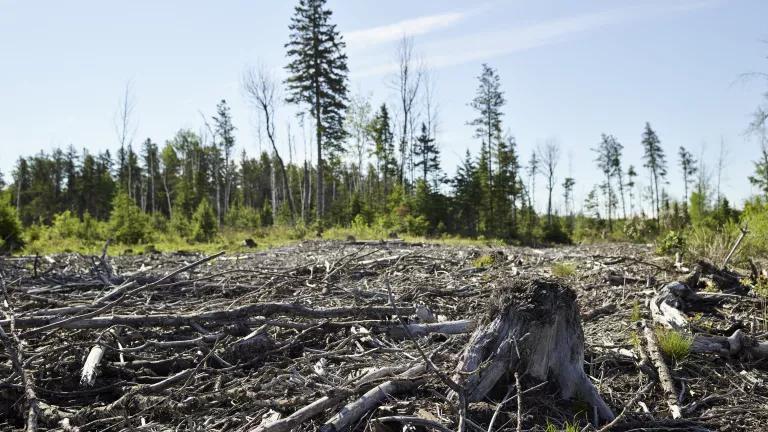SFI’s Proposed Updates Offer Greenwashing, Not Solutions
They play lip service to Indigenous Peoples, climate change, and threatened species, without requiring any meaningful requirements for forest operators to actually protect them.

Clearcut in Ontario
The Sustainable Forestry Initiative (SFI) is infamous in the world of forest conservation. SFI is a forest and forest products certifying body which claims to provide “supply chain assurances” about the sustainability of products. Logging industry associations created SFI as an alternative to the Forest Stewardship Council (FSC), which was established in the 1990s through the collaboration of environmental organizations, human rights groups, and companies concerned about global deforestation. SFI continues to be industry-dominated in its decision-making and policies, and for years, NRDC and other environmental groups, academics, and industry watchdogs have publicly exposed its certification as greenwashing. Dozens of major companies have committed to distancing their supply chains from SFI. Critics have highlighted that while SFI takes no meaningful steps to mitigate industrial operations’ forest impacts, it offers the appearance of “sustainable forest management” to irresponsible forestry practices that would threaten communities’ rights, degrade landscapes, threaten species, and erode climate-essential carbon sinks. Because SFI represents itself as a legitimate alternative to the much more robust FSC, it threatens to confuse members of the public who mistake the SFI logo with evidence of sustainably sourced forest products. This trend continues with the announcement of SFI’s proposed new standard for its certified operations, which as we detail below, simply provides companies with new ways to greenwash unsustainable forest harvesting.
None of this should be particularly surprising, even while it is disappointing. When industry associations created SFI, they were concerned by the stringency of FSC’s standards, but rather than rejecting certification altogether, they recognized the public-facing value of stating their products had been sourced ethically. They therefore created an alternative certification standard with reduced transparency, requirements for operators, and non-industry actor influence. Despite SFI having significantly lower standards than FSC, governments and companies often characterize the two certification systems as interchangeable, undermining the incentive for forest managers to adopt FSC’s more robust requirements. For example, when the government of Canada states that “all” of its forest certification systems “meet rigorous standards,” it obscures the fact that SFI offers to rubberstamp environmentally egregious forestry practices.
As the subject of intense criticism over its weak social and environmental requirements, SFI has had years to improve its certifying system. SFI periodically updates its guidelines for forest operations, and has offered the public the opportunity to review its proposed “revised” 2022 forest management standard. And having observed some of the praise given to its competitor FSC for its enhanced new standard, SFI boasts that its new requirements will help “protect water quality, biodiversity, wildlife habitat, species at risk and forests with exceptional conservation value.”
Yet sadly, we can report that SFI’s proposed updates are an extension of its past policies, relying on lax and nebulous recommendations rather than obligatory and meaningful safeguards. It plays lip service to Indigenous Peoples, climate change, and threatened species, without requiring any meaningful requirements for forest operators to actually protect them. We are concerned it will continue to confuse consumers and purchasers earnestly seeking sustainable forest products.
SFI’s continued greenwashing could not come at a worse time: meteorologists say 2020 will be the hottest year on record, with temperatures in Siberia surpassing 38 degrees Celsius (100 degrees Fahrenheit) this month. Climate scientists have identified forest protection as critical in the fight against devastating climate change. Yet forests are declining at an alarming rate, with industrial logging playing a significant role in deforestation and forest degradation. Groups like NRDC have highlighted the need for companies to reduce their use of intact forest pulp, and in tandem, rigorous and scientifically sound forest certification bodies could help consumers identify where more sustainable forestry operations have taken place. But SFI’s proposal takes us dramatically in the wrong direction, offering to launder forest-harming operations by giving them a green seal of approval.
Today, NRDC submitted comments in response to SFI’s proposed standard. Below are some of our key concerns.
- SFI Does Not Require Free, Prior and Informed Consent (FPIC): We are deeply concerned that the new standard does not explicitly require organizations to obtain Free, Prior and Informed Consent from Indigenous Peoples who could be impacted by organizations’ proposed activities. It is not enough to require organizations to be “in compliance with all applicable laws” with respect to the rights of Indigenous Peoples; voluntary certification bodies should go beyond requiring companies to act within the law. SFI references the United Nations Declaration of the Rights of Indigenous Peoples as a resource for organizations, but this reference is far from enough. SFI should, at a minimum, require organizations to obtain Free, Prior and Informed Consent before engaging in operations that impact the traditional territories, resources, and rights of Indigenous Peoples. SFI should additionally require organizations to provide Indigenous communities with significant roles in the independent audit process.
- SFI Allows Conversion of Natural Forests into Plantations: We are alarmed to see that the proposed SFI standard continues to allow the conversion of forests into non-forest use including plantations, if the organization completes an “assessment” of the anticipated impacts first. While the standard indicates that conversion is not allowed in some instances (for example, forest types “critical to threatened and endangered species”), there is no evidence that these exceptions will be determined by peer-reviewed science, or in consultation with Indigenous and academic wildlife experts. In light of widespread, non-science-based industry claims that industrial logging is not harmful to threatened and endangered species, we are concerned that organizations will have enormous leeway to claim that they are meeting SFI’s threshold while continuing to put threatened and endangered species’ habitat at risk.
- SFI Has No Meaningful Protections for Threatened Species Habitat: The proposed SFI standard has very ill-defined and non-obligatory language around organizations’ duty to protect the habitat of threatened species. SFI-approved operations could thus be able to continue degrading the habitat of species like the boreal caribou, a threatened indicator species whose declining populations reflect broader ecological instability in Canada’s boreal forest. In contrast, the Forest Stewardship Council Canada has created new safeguard requirements for operations that could impact boreal caribou habitat, with significantly more robust policy requirements for operators than SFI’s vague guidance.
- SFI Continues to Permit Clearcuts: SFI allows clearcuts larger than 120 acres in ill-defined circumstances, for example, “when necessary… to achieve ecological objectives.” These “ecological objectives” are extremely nebulous and could easily be used to justify clearcutting in large areas of intact forest, especially considering that SFI’s communication materials claim without caveat that its own certified forest harvesting operations are beneficial to the global climate, an unnuanced position which is in conflict with peer-reviewed science.
- SFI Permits the Use of Highly Hazardous Pesticides: SFI allows the use of highly hazardous pesticides classified as 1A and 1B by the World Health Organization “where no other viable alternative is available.” Dangerous pesticides should not be permitted under any circumstances.
- SFI Has No Meaningful Requirements around Carbon Storage and Climate Change: A gaping hole in SFI’s proposed standard, is the omission of any meaningful obligations for organizations to reduce the carbon emissions associated with their logging operations. SFI acknowledges the threat of climate change, but treats industrial harvesting as a blanket climate solution, stating “We know that when we actively manage our forested landscapes for wood products, we can maintain forests as a carbon sink.” While global pressure increases for forest product producers and purchasers to measure, publicly report, and reduce their Scope 1, 2, and 3 emissions, SFI instead vaguely requires organizations to be “aware of the effects of their management on forest carbon dynamics as they relate to climate” and take those considerations “into account.” This is particularly concerning in light of evidence that deforested “scars” from widescale industrial logging in Canada’s boreal forest have remained for decades after harvesting, indicating that forest managers are severely overestimating replanted commercial forests’ ability to recover lost carbon.
- SFI Does Not Explicitly Prohibit Genetically Modified Trees in Certified Forests. SFI’s proposed standard does not explicitly prohibit the use of GMOs (genetically modified organisms) in its forests beyond 2022. This is concerning considering the large data gaps and risks around GMOs in forests.
- No Required Protections for Intact and Primary Forests. Intact and primary forests are critical for carbon storage and protecting plant and animal biodiversity. There is growing global consensus that large areas of the natural world need to be protected in order to avoid the worst effects of climate change and mass species extinction, including national governments’ commitments to protecting thirty percent of the world’s natural areas by 2030. Voluntary certification bodies should therefore build on and enhance these commitments. Yet the proposed standard has no requirements for organizations to set aside and protect primary or intact forests, either from a carbon storage lens or species protection lens.
SFI seems to have spent a good deal of time and resources crafting language that could appear to make its certified operations more sustainable. At closer analysis, however, it’s clear that the proposed standard offers more of the same old greenwashing. We urge SFI to dramatically improve—rather than aesthetically tweak—its policies, and to become part of the forest solution rather than an ongoing part of the problem.



